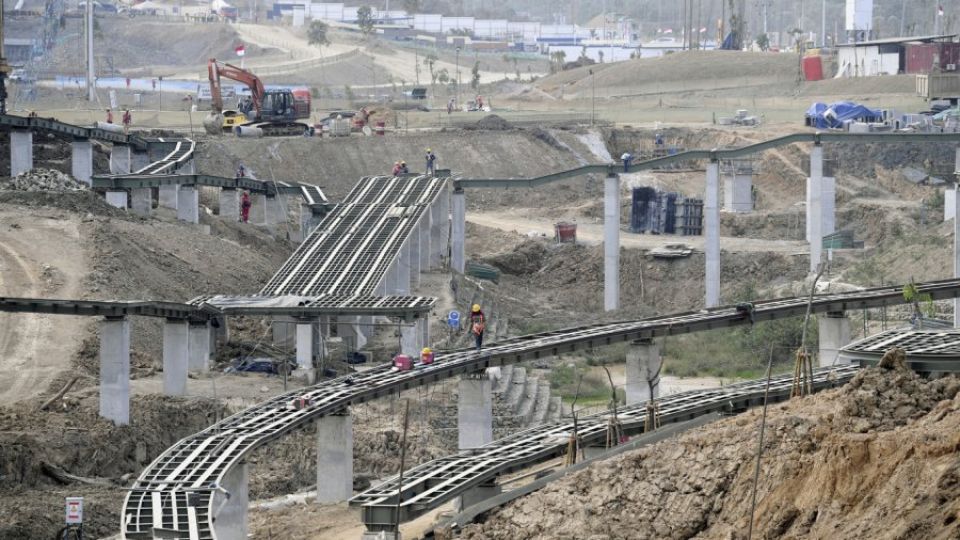September 12, 2023
JAKARTA – Promoting the country’s ambitious Nusantara capital city project at the Group of 20 Summit in India last week, President Joko “Jokowi” Widodo returned to Jakarta with four fresh investment commitments, albeit still with no concrete promises of actual funding.
Meeting with numerous world leaders in New Delhi starting on Friday, Jokowi on top of reiterating his message of equality among all nations also attempted to woo foreign investors into throwing their hats into Nusantara, an ambitious relocation project estimated to cost Rp 466 trillion (US$32.6 billion).
On the G20 sidelines, Jokowi met with, among others, Dutch Prime Minister Mark Rutte, Italian Prime Minister Giorgia Meloni and French President Emmanuel Macron, of which the last meeting produced four letters of intent (LoIs) for the development of Nusantara.
“I appreciate the efforts of the French ambassador to Indonesia in bringing investors to Nusantara,” Jokowi said during his meeting with Macron, “I hope that this new agreement will be actualized soon.”
The same sales pitch was also made to Italy’s Meloni, with whom Jokowi also promoted Indonesia’s plans to establish an electric vehicle (EV) ecosystem and green infrastructure.
Yet despite an increase in Italy’s investment in Indonesia, including the opening of a Piaggio factory in West Java last year, Rome is seemingly hesitant about investing in Nusantara, with no reports of the bilateral meeting producing any outcomes.
A struggling pitch
In recent years, the government has been making aggressive promotions for the Nusantara project, whose funding has been designed to mostly rely on public-private partnerships and private investments, with less than 20 percent of costs shouldered by the state.
A $30 billion hole was left in 2022 after Japan’s SoftBank Group decided to withdraw its investment commitments, kick-starting the Jokowi administration’s vigorous sales pitch all over the world including to countries like China, Finland, Germany, the United Arab Emirates (UAE) and Singapore.
But despite having pulled out all the stops, Jakarta has struggled to score anything beyond LoIs, of which it already had hundreds before the newest French intent.
At the ASEAN Summit held last week in Jakarta, Indonesia once again promoted the Nusantara project at the ASEAN-Indo Pacific Forum (AIPF), which was attended by numerous international representatives hailing from across Southeast Asia.
Indonesia received another 270 LoIs at the ASEAN Investment Forum, but only Rp 20 trillion, or less than 5 percent of Nusantara’s estimated cost, was in actual private investments, mostly in the entertainment sector.
Too uncertain
Economists have previously noted that Nusantara’s future prospects are too uncertain to attract foreign investors. For one, it remains unclear whether the mega project will be continued after Jokowi’s administration comes to an end next year, a persisting worry despite the President’s attempt to convince investors otherwise.
Visiting Singapore in early June, Jokowi said that whoever his successor may be, they will remain focused on turning Indonesia into a “powerhouse and a giant of Asia”, such that investing in Nusantara would be a safe bet.
“Then there is another question about incentives. Easy, lah!” Jokowi said at the time, explaining the 300 investment packages that have been prepared by the government for the private sector.
The packages are estimated to be valued at $2.6 billion.
But these incentives are likely to be insufficient at attracting investors, said Center for Strategic and International Studies (CSIS) executive director Yose Rizal Damuri on Monday, given the short deadline and unclear business prospects.
“A capital city project is a public goods project,” Yose told The Jakarta Post, “It’s the government that should first showcase that they have the money to kick start much of the development. This project will definitely benefit Indonesians, but whether it will do the same for private businesses remains unclear.”


